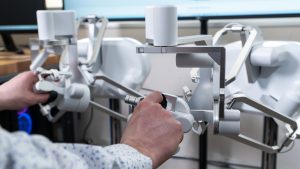For someone whose company just reported a 74-per-cent decrease in annual revenues on Wednesday, Edgewater Wireless (TSX-V:YFI) CEO Andrew Skafel is in high spirits.
If he were a bit bummed this week, one would understand. The Ottawa-based developer of high-density Wi-Fi solutions saw revenues of $72,607 for the fiscal year ending April 30, down roughly $200,000 from the year before, due primarily to global supply shortages of key product components. The company’s share price, which hit an all-time high of 84 cents earlier this year, is back down to 15 cents this week.
And in an auditor’s note on Edgewater’s annual financial statements, KPMG wrote that the company’s growing $40-million deficiency might affect its ability to continue as a going concern.
(Sponsored)

How Carleton is using simulation and visualization to improve training, design and human performance
From healthcare to aviation to architecture, simulation and visualization tools have become an essential part of training, analysis and decision-making in sectors that rely on precision. At Carleton University, researchers

For the fifth year in a row, Ottawa will become the epicentre of Canadian culinary excellence in late January. Chefs from Ottawa, Vancouver, Edmonton, Calgary, Saskatoon, Winnipeg, Toronto, Montreal, Moncton
So why was Skafel so chuffed speaking to OBJ this week? He believes Edgewater Wireless is on the cusp of capitalizing on a pivot a couple years back to focus on opportunities in high-density Wi-Fi.
Two recent wins – landing vendor status with cable provider Mediacom and signing the Kroger grocery chain to a deal – are proof positive of Skafel’s confidence. The company’s order backlog also sits well above $1 million at this point, more than 10 times at the same time last year.
With a sizeable backlog, two giants behind it and a global Wi-Fi market that researchers expect to surpass US$15.6 billion by 2022, Edgewater is hoping its fiscal 2018 will soon be little more than a bad memory.
Multi-lane Wi-Fi
Edgewater has been sinking its development efforts into its new WiFi3 technology, which helps large venues – think stadiums or even a big-box grocery store – to deliver internet connectivity to many users.
To understand how, think of Wi-Fi as a highway. Most connections are single channel, so when users log on, all the traffic is being funnelled through one lane.
“When you start (adding) a lot of cars, a lot of traffic, it gets really slow,” Skafel explains.
To accommodate traffic, say at a Major League Baseball game where everyone is trying to log on to stadium Wi-Fi and post the same shot of the field to Instagram, Edgewater’s solution just adds more channels.
“We’ve built the industry’s only multi-lane highway for Wi-Fi.”
Edgewater Wireless CEO Andrew Skafel
“We’ve built the industry’s only multi-lane highway for Wi-Fi,” Skafel says.
The company developed this solution with CableLabs, a not-for-profit R&D hub for the cable industry, and got its first major product validation earlier this year when Kroger, the second-largest retailer in the United States, selected Edgewater to power its in-store Wi-Fi. Though the sales cycle on a deal like this stretched well beyond a year, Skafel says the effort has paid off.
“That’s really put some wind into our sails,” he says.
While developing products for a Fortune 50 customer is a feather in Edgewater’s cap, the Ottawa-based firm’s solution is also deployed closer to home at Supply & Demand in Westboro. Skafel says the restaurant turned to Edgewater when its customers were experiencing slow connection speeds due to interference from surrounding hot spots.
In-home opportunities
The other major recent win for Edgewater was achieving official vendor status with Mediacom, the fifth-largest cable operator in the United States. Skafel says integrating with a big carrier has been a crucial step for Edgewater, and the local firm is just getting the cable operator’s sales team familiar with the technology before sales ramp up in this area.
While the big commercial plays will make a sizeable impression on Edgewater’s balance sheet, Skafel says getting into the residence space through Mediacom holds enormous potential.
With the rise of the Internet of Things, homes themselves are becoming high-density Wi-Fi areas with dozens of connected devices feeding into a single access point.
“That’s where the lion’s share of Wi-Fi is deployed,” Skafel says.
In order to meet the demands of new customers and sales channels, Edgewater raised $2 million in a private placement earlier this summer. Skafel wouldn’t disclose the exact number of employees at the firm’s Ottawa headquarters during the interview, but did say that the relatively small team is expected to double in size in the coming year as it prepares to execute on a years-long plan.
“This upcoming year for us is one where we continue to transform ourselves from a development-stage company to a production company,” Skafel says.





